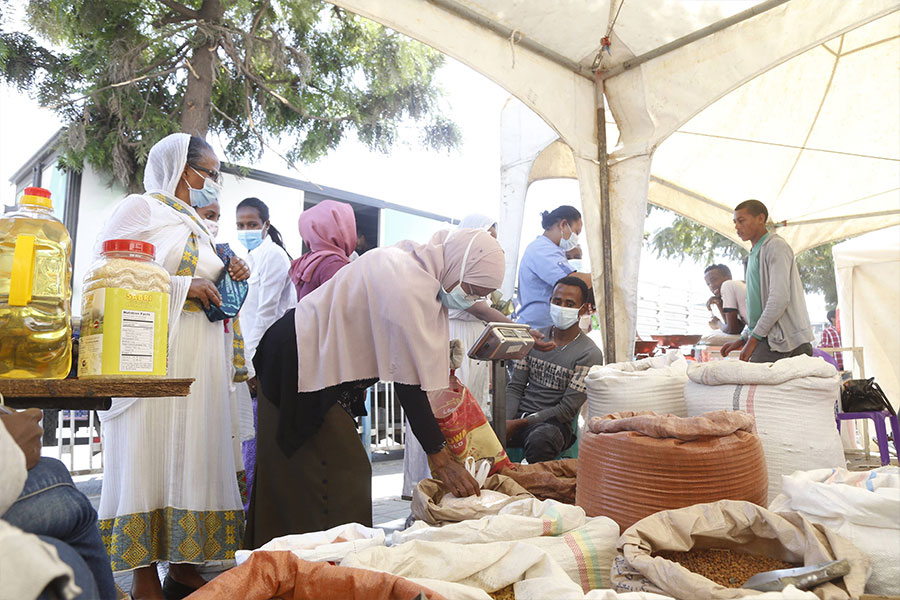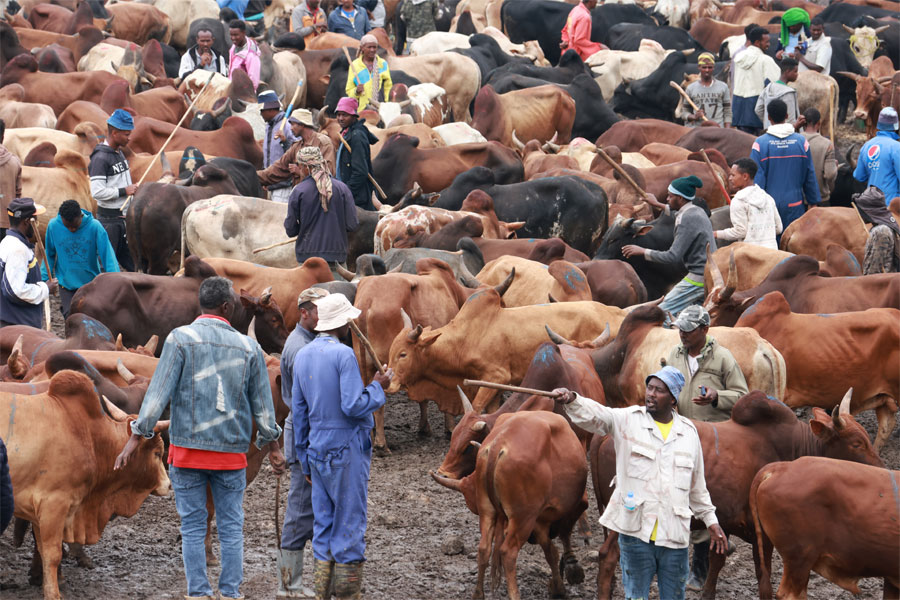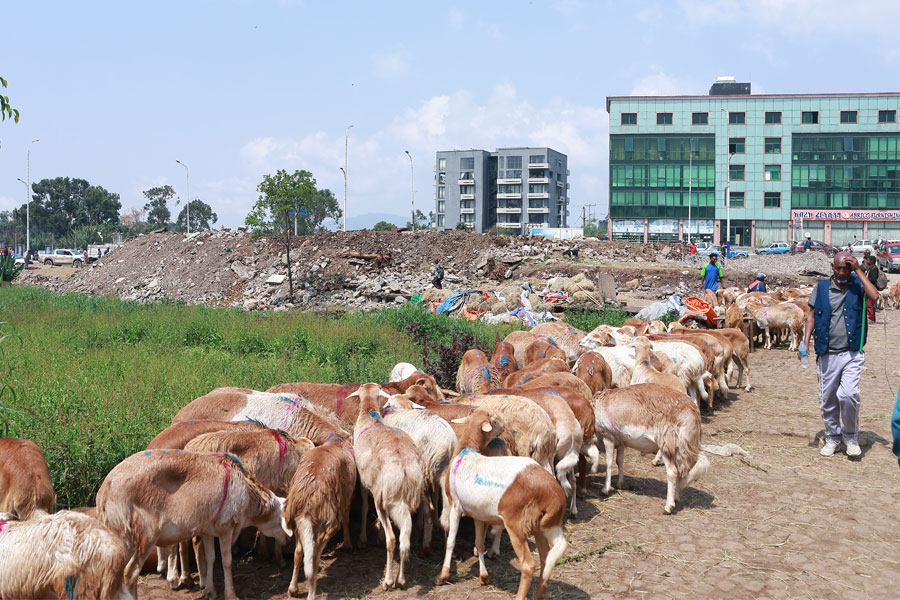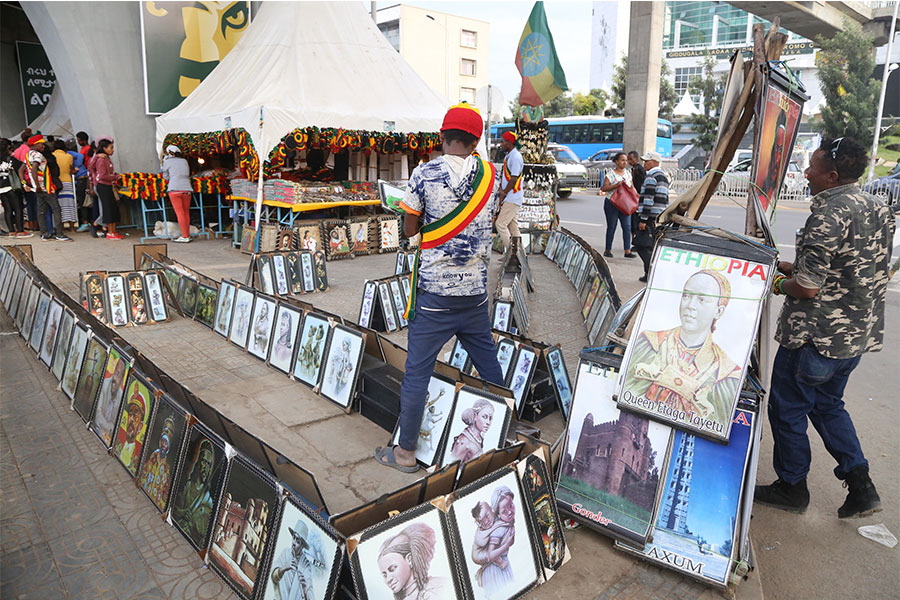
Girum Kebede, 52, would have thought that a net monthly salary of 10,000 Br was sufficient to have a contented living in the not-too-distant past. His monthly earnings are the lifeline for his wife and child. The couple is expecting a second child.
The earning meant that a breadwinner providing for a family of four would not have had much to worry about when going to holiday markets. Such an income would have been enough to cover at least the essentials – butter, vegetables, spices, teff, a chicken, and eggs. Girum now thinks the prospect of buying all these items is akin to a daydream. He discovered this when shopping last Wednesday at Shola Market, one of the largest trade hubs in Addis Abeba. Near the Megenagna area, the market was packed with hundreds, if not thousands, of traders offering food items and consumer goods. Though many shoppers were inching their way across the market's narrow paths to buy what they needed to prepare food for the Easter holiday, the scenes were more hushed than usual.
Girum was looking to buy a chicken, some onion, and butter. He was taken aback by the sudden and drastic price changes in the market. He decided to buy nothing but half a kilo of butter for 350 Br, preferring to wait until the market settles down before buying the other items on his holiday shopping list.
Girum's dilemma illustrates the tragedy of what was once a middle-income urban group with purchasing power now eroding fast and alarmingly. While the cost of living hit the roof, the fixed income of many remains unchanged. They are terrified of seeing inflation and depreciation of the Birr eating up their living standard, edging to the margin.
Gauged by the Consumer Price Index (CPI), headline inflation measures the average change in prices consumers pay for a basket of goods and services. Reports from the Ethiopian Statistics Service highlight how rapid inflation continues to gallop. Month-on-month headline inflation in March registered at 34.7pc. Food inflation clocked in at a staggering 43.4pc, the highest recorded in over a decade.
The past two years have hardly been a walk in the park for policymakers grappling with the ballooning cost of living. The ripple effects of the COVID-19 pandemic linger, putting pressure on import-dependent economies such as Ethiopia. Pandemic-induced logistics disruptions take part of the blame for the galloping costs, along with the depreciation of the Birr against major foreign currencies.
Then there is the protracted civil war in the north, where the federal government has spent untold billions fighting armed forces based in the Tigray Regional State. Costs to repair the damage done to infrastructure in the conflict zones and the war's overall impact on the economy are shouldered by the public. The militarised conflict has undermined external financial support, agricultural productivity and crippled local industries.
Federal officials had tried their hand at a few monetary policy measures to rein in the galloping inflation, such as a four-month freeze on collateralised loans. Neither do attempts to restrict and freeze property transactions seem to have done much good, however. The inflationary pressure has created a vicious cycle. Coupled with the cost of an expensive war, growing public expenditures are widening the budget deficit. It is expected to reach four percent of its GDP this year.
Another militarised conflict thousands of miles away could have disastrous consequences for the sputtering economy. Both Russia and Ukraine are major sources of iron products, wheat, cooking oil, and fertiliser. These are strategic commodities the federal government spend billions of dollars to import. Following Russia's invasion of Ukraine, global prices for cooking oil rose by as much as 45pc. Local markets did not take long to respond to the changes. Consumers are expected to shell out 1,000 Br for a five-litre bottle of imported sunflower oil, nearly double what they had been paying a few months ago.
Butter went for 700 Br a kilo last week. The prices are much higher than what traders quoted in the lead up to Christmas a few months ago.
The pressure has pushed officials to take measures to cut down on expenditures. Federal subsidies were the primary targets, inevitably driving further costs for essential commodities. On the list of subsidy cuts are utilities, fuel and wheat. The federal government is preparing to entirely remove subsidies on petroleum products over a year, beginning July.
Last week, the International Monetary Fund (IMF) released an assessment of the Russian-Ukraine war's impact on Ethiopia's economy. It warns of higher transport costs feeding to increasing prices and food inflation. According to the IMF, higher global fuel prices will result in even higher price rises in the domestic market.
"If the government reverses its decision to remove the subsidy, higher global prices will be a bigger drag on the budget,” reads the assessment. "Urban consumers may be affected more."
IMF warns Ethiopia’s policymakers that the main impacts would be higher inflation driven by food and fuel and worsened food insecurity.
The impact the IMF fears are here and now. The holiday season is making them even more pronounced.
During the last major holiday market (Christmas), a kilo of butter was sold for an average of 500 Br, 60pc lower than last week.
Prices for spices and herbs have also gone up. A spice mix often used for stews stands at 1,000 Br a kilo, 25pc higher than what markets offered for the New Year celebrations last September. Traders argue the upsurge is due to rising import costs as one of the ingredients is shipped from abroad.
Although the prices for onions have been steady for the past few months, since a record high of over 50 Br a kilo was reported last year, they remain relatively high. A kilo of red onion was sold for 40 Br, while a local variety preferred for use as an ingredient in doro wot (chicken stew) goes for 70 Br a kilo, 75pc higher than last year's prices. The stew is the first meal served in households adhering to the Ethiopian Orthodox Church following two months of lent.
The high costs have undoubtedly terrified more than a few shoppers. However, the section of Shola Market where chickens are sold appeared more lively than the other quarters. Perhaps this is because chicken prices have not changed much since the Christmas holiday.
Martha Adane, a 25-year-old woman, strolled, scouting for a chicken she thought she could afford. Martha makes a living running a small eatery with two of her sisters. She had come from the CMC area with one task in mind that day: find and buy a chicken for the lowest possible price. Traders in her neighbourhood had offered her a chicken for 1,200 Br. It is an amount that claims a quarter of the combined income earned by Martha and her sisters. Factoring in the 2,000 Br they pay for rent, spending 1,200 Br for a chicken was unimaginable for her.
A small-sized chicken was going for 500 Br at Shola Market, while prices for larger fowl went up to 800 Br. These are prices about the same as observed last Christmas. However, Martha opted to leave in hopes of buying a crossbreed chicken from Elfora Agro Industries, a subsidiary of MIDROC Ethiopia Investment Group. In business since 1997, Elfora is reputed for supplying chickens and eggs at affordable prices.
Elsewhere in Addis Abeba, shoppers were out looking to buy cattle. Qera is a neighbourhood known for its cattle markets. Fewer buyers than usual were in the area last week. Some seemed to have dropped by only to scope out prices, leaving abruptly after hearing what dealers ask for. Prices for a sheep went from 5,000 Br to 9,000 Br depending on size, while a goat could fetch anywhere between 9,500 Br and 30,000 Br. Bulls were sold for as much as 120,000 Br a head.
Seyoum Shance has been trading cattle at Qera for over a decade. He is surprised by the exorbitant prices this year.
"I had sold some cattle for 30,000 Br last year," Seyoum told Fortune.
Though the market attracts thousands ahead of the holiday, Seyoum says he does not expect a large crowd this time around. Rising transportation costs are partly to blame for the upsurge in prices. Seyoum paid 30,000 Br to ferry 30 oxen from Moret'na-Jeru Wereda in the North Shewa Zone of the Amhara Regional State.
Dealers say the upsurge in price is due to instability in areas where the cattle are sourced. A drought is plaguing the east and south of Ethiopia, where large portions of the population are pastoralists, which is not helping the situation.
The drought is "the worst in four decades", and the United Nations estimates that 20 million people in Ethiopia, Somalia and Kenya could face starvation if response efforts are not beefed up in the coming weeks. Close to 1.5 million cattle in the Somali and Oromia regional states are estimated to have died due to the drought thus far.
Experts say the economy is undergoing an unusual beating and might not respond to by-the-book measures.
Macroeconomic management alone cannot address this issue, argues Adane Tuffa (PhD), an economist who is a member of the Agricultural Economics Society of Ethiopia. He observed that supply shortages are not the only factor behind galloping inflation.
“Especially during holiday seasons, intermediaries manipulate supply,” he said. “One of the policies that can help the government is regulating the agricultural value chain from the source.”
Officials of the Addis Abeba City Trade Bureau try to do precisely that. They have organised a task force determined to "control" the holiday market.
The Bureau recently approved a revolving fund of one billion Birr for the 11 cooperative unions operating in the capital. These cooperative unions have more than 150 consumers' association shops under their wing. They have supplied 270,000qtl of teff and wheat, 1.5 million litres of cooking oil, and 120,000qtl of sugar across 11 districts in the lead up to the holiday.
Small-scale bazaars have also been organised in different parts of the city to distribute these products, says Mesfin Assefa, deputy head of the Addis Abeba Trade Bureau. Four months ago, the Bureau began a Sunday market scheme that connects consumers with producers.
The city administration has disbursed half a billion Birr in loans to 10 unions in the capital to facilitate the Sunday markets. They supply consumer cooperatives with commodities to sell at discount rates. The weekly markets have been well received by consumers, too.
Nonetheless, the cost of living continues to assault families in the city. Girum, the shopper in Shola Market, says all he can do is be grateful that he does not have to worry about rent.
PUBLISHED ON
Apr 22,2022 [ VOL
23 , NO
1147]

Commentaries | Jan 18,2019

Commentaries | Jul 24,2021

Agenda |

Commentaries | Feb 12,2022

Agenda | Sep 09,2023

Commentaries | Nov 18,2023

Featured | Apr 30,2021

Agenda | May 04,2024

Radar | Apr 26,2019

Commentaries | Jan 22,2022

Dec 22 , 2024 . By TIZITA SHEWAFERAW
Charged with transforming colossal state-owned enterprises into modern and competitiv...

Aug 18 , 2024 . By AKSAH ITALO
Although predictable Yonas Zerihun's job in the ride-hailing service is not immune to...

Jul 28 , 2024 . By TIZITA SHEWAFERAW
Unhabitual, perhaps too many, Samuel Gebreyohannes, 38, used to occasionally enjoy a couple of beers at breakfast. However, he recently swit...

Jul 13 , 2024 . By AKSAH ITALO
Investors who rely on tractors, trucks, and field vehicles for commuting, transporting commodities, and f...

Jul 12 , 2025
Political leaders and their policy advisors often promise great leaps forward, yet th...

Jul 5 , 2025
Six years ago, Ethiopia was the darling of international liberal commentators. A year...

Jun 28 , 2025
Meseret Damtie, the assertive auditor general, has never been shy about naming names...

Jun 21 , 2025
A well-worn adage says, “Budget is not destiny, but it is direction.” Examining t...